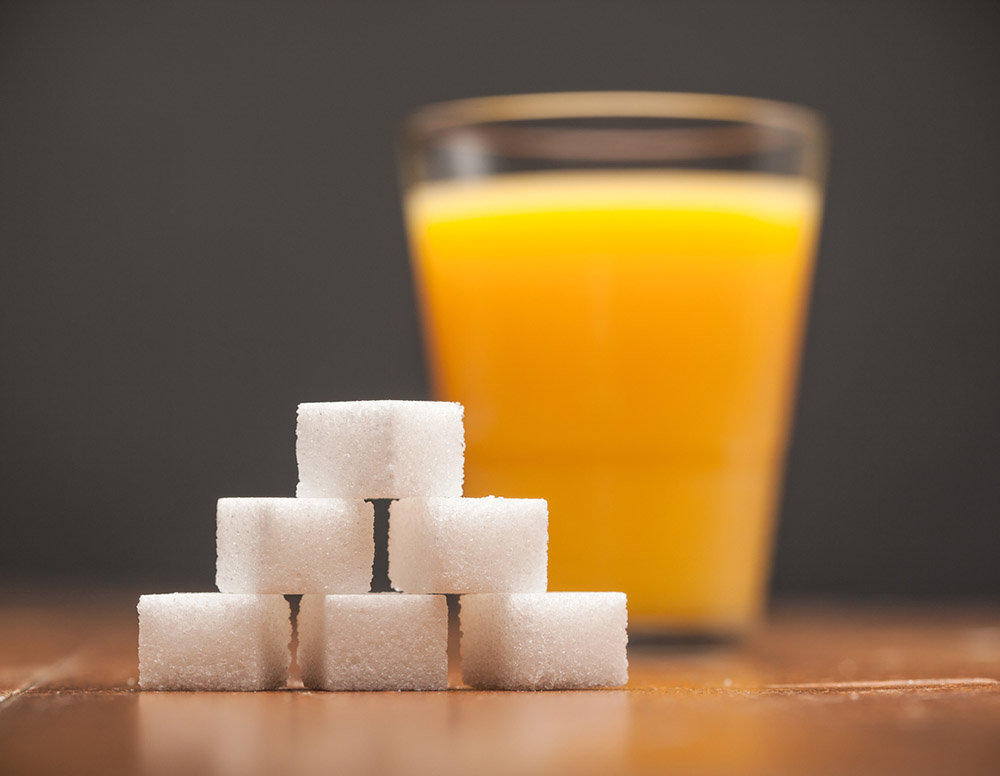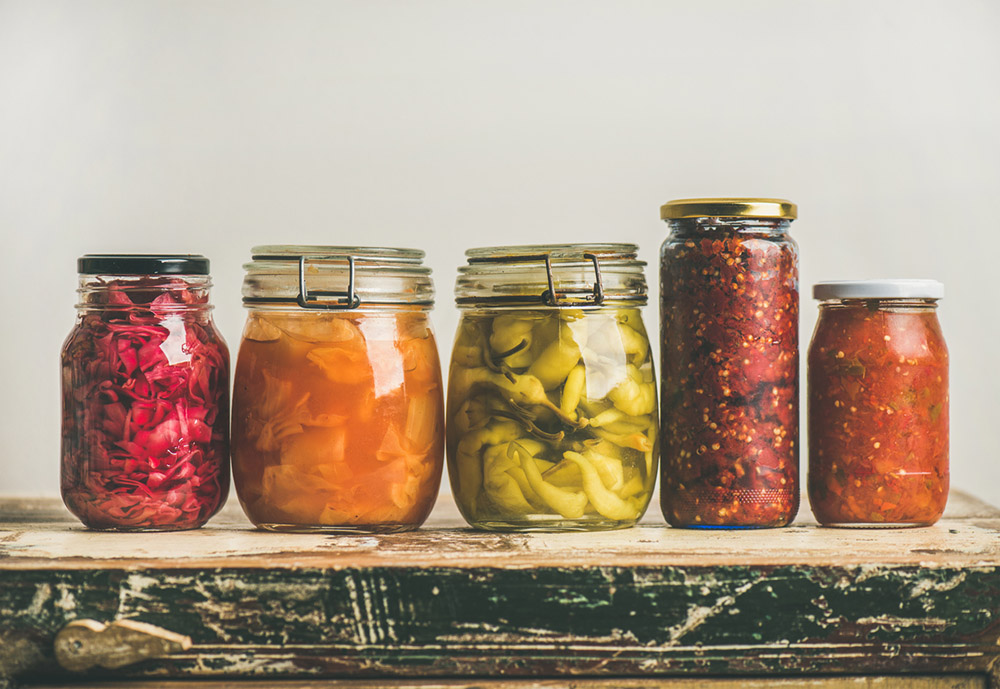Feeling bloated? We asked nutritionist Rick Hay how you can getter a flatter stomach overnight. Here’s what he suggests
You’ve been hitting the gym daily, eating your vegetables and keeping yourself hydrated, but then you wake up and there it is, an unwanted bloated belly. Why? It’s frustrating when you’re trying your hardest to make healthy choices but the tummy area just doesn’t want to play ball.
We asked Healthista’s nutritional director Rick Hay to explain what might be causing our bloated bellies and what steps we can take overnight for a flatter stomach tomorrow.
First let’s look at what’s causing your bloating belly.

Bloating cause #1 Added sugar
You may think you’re buying and eating all the right foods but it’s time to check again. Nowadays, we are all aware of the traffic light system when looking out for the nutrition information on the food we buy – red means high fat or sugar, orange is moderate and green is low.
However, you may need to start looking at more than just the traffic lights and start studying the ingredients list, even if it’s low in sugar and fat.
Xylitol is a type of added sugar or sweetener that can be bad news for the gut if consumed in excess.
‘Check the ingredients list first, if you can’t pronounce it, it might not be good for you,’ suggests Hay. Next time you’re umm-ing and ahh-ing over a product ingredient list, ask yourself, ‘Can I buy these ingredients easily at a supermarket or health food store?’ If you can’t, maybe think twice about buying it or do some research first.
Also, if there are some ingredients you aren’t too sure on, make sure they are further down the ingredients list. Ingredients are listed in order of most-used first, so make sure the healthiest ones are highest on the list.

People who are looking to lose weight often think that buying shop-bought juices or smoothies and cereals are lower calorie, healthier options.
In fact, these thought to be healthy options could be filled with added sugar which is one of the most unhealthy parts of the modern diet.
But Xylitol, a type of added sugar or sweetener can be bad news for the gut if consumed in excess. Too much xylitol could cause stomach discomfort and diarrhea – both bad news if you’re wanting to avoid a bloated tummy.
For a flatter stomach, avoid shop bought juices or smoothies by making your own at home. Where cereals are concerned, check the ingredients or stick to oats.
Bloating cause #2: Eating too much fruit, legumes and lentils
Lots of people who follow new healthy diet regimes can often overdo the fruit, vegetables and pulses. Although these foods are indeed healthy, too much of them, too often could lead to bloating.
Fruits, vegetables and pulses are packed full of dietary fibre which is incredibly important for our digestive health and promotes regular bowel movements. Fibre is also popular when looking to lose weight as it keeps you fuller for longer.
Instead of fibre helping assist with bowel movements, over doing it could do the opposite.
Although these are healthy options, some don’t realise that too much can be tough on your system, especially if it’s not used to it. Having a plate full of broccoli, chick peas and kidney beans may be healthy but could also be bad news for your gut.
Instead of fibre helping assist with bowel movements, over doing it could do the opposite. Increased amounts of fibre may lead to a compromised and over loaded digestive system, causing constipation, flatulence, cramping and stomach upset, which won’t help with bloating issues.
Bloating cause #3: Food intolerances
It can be unclear why a person is sensitive to certain foods. Symptoms of food intolerance include tummy pain, bloating, wind/gas or diarrhoea and certainly unexplained bloating.
Some more severe intolerances can lead to skin rashes and itching. It can be difficult to know whether you have a food intolerance or not as the symptoms are general and typical of many other conditions too.
People who experience symptoms after consuming dairy products are lactose intolerant, meaning the body can’t digest lactose, a sugar found in milk, yogurts or soft cheeses. Or they may be reacting to a protein found in milk called a1. It’s possible to get milk that contains only a2 protein, which often causes less intolerance for people.
Read more about a2 protein intolerance here
People who experience symptoms after eating bread may have a wheat intolerance also known as wheat sensitivity. or they have be reacting to the gluten, a sticky protein used to make most commercially bought breads.
Others may be intolerant to chemicals or food additives such as alcohol, caffeine, artificial sweeteners, monosodium glutamate (MSG) or histamine (found in mushrooms, pickled and cured foods).
For people who have jumped on the health wagon, an intolerance they don’t always see coming is to whey protein.
Many people can be unaware they have an intolerance due to it being on such a slight scale, blaming their tummy pains or bloating on other reasons.
An excellent way to get to know your intolerances is by using the elimination diet. If you have an idea which foods may be causing your bloated symptoms, try excluding them from your diet one by one.
Aim to cut the suspected food out of your diet for two to four weeks to see if your symptoms improve. Then reintroduce the foods to see if any of your symptoms return.
Keep a diary observing how you are reacting to the eliminated or reintroduced food can help. Note down what foods you have or haven’t eaten, record your symptoms after eating these foods and how soon these symptoms came on.
For people who have jumped on the health wagon, an intolerance they don’t always see coming is to whey protein. When exercising we are told to up our protein, and rather than eating tins and tins of tuna we turn to whey protein powder as a protein quick fix.
Milk has two types of protein, whey and casein, these both contain lactose. This means for people with an intolerance to lactose, even if only slightly, may suffer symptoms of bloating and stomach discomfort after drinking a whey protein shake.
If you think this may be the reason for your bloating try switching to a vegan protein or other lactose-free alternatives.
Bloating cause #4: The warm weather
When the weather tends to heat up, fluid retention can lead to an excessive build up of fluid in the circulatory system. This fluid retention tends to affect the ankles and legs but can also affect the abdomen, leading to bloating.
In the warm weather this is caused by dehydration. When the body is dehydrated, it holds onto as much water as it can to prevent the dehydration occurring again.
When you do get round to drinking lots of fluids to rehydrate yourself, you are likely to store this fluid around your abdomen, causing you to feel puffy and bloated – not what you need on a hot summer’s day.
To help this, make sure you stay hydrated by drinking two to three litres of water a day. If it’s been particularly hot or you have been doing lots of exercise try and up this to four litres of water a day.
6 steps to do tonight for a flatter stomach tomorrow
It’s kind of SOS body times right now. What with the sparse clothing we’re forced to wear thanks to the very un-British summer we’re having, beckoning holidays or the lure of skimpy summer party dresses, no one is going to welcome a bloating belly right now.
That’s why nutritionist Rick Hay has put together this natural overnight tummy tuck. It’s a list of steps you can do tonight for a flatter stomach in the morning.
And let’s be clear, you’re bikini- and beach-body ready anytime. But if you want a flatter stomach fast, this is what helps.
5pm: take a tablespoon of aloe vera juice in water
Research into Aloe vera has shown that the gel has gastroprotective effects.
‘Just as aloe vera soothes sunburn on the outside, it provides relief internally too,’ says Hay.
The aloe plant, known for its soothing and calming properties is mostly used topically and in beauty products, to treat hair and skin conditions. But it turns out, it’s also excellent for soothing and calming the stomach.
READ MORE: Learning to love yourself: 7 ways to overcome self-doubt

For the stomach, aloe vera is most commonly used in the form of juice. ‘Juice is easy on the stomach and it also quickly absorbed,’ explains Hay. Its anti inflammatory properties can help provide relief against heart burn, cramping and bloating. It also has anti bacterial action that can help to boost immune function.
Try: Pukka Herbs Aloe Vera Juice, available to buy on Amazon in the US and in the UK.
For help with bloating aloe vera helps to flush out toxins and promote regularity. So at 5pm, take a tablespoon of aloe vera in a little juice or water. This can be done daily if you get bloating or constipation regularly.
6pm: take digestive enzymes at dinner
Consider taking a digestive enzyme tablet with your dinner. It is estimated that 60-80% of the immune system is located in our digestive tract. When food isn’t broken down adequately by digestive enzymes in our stomachs, the larger pieces of food can cross the intestinal wall leading to an inflammatory immune response. This has been linked to food intolerances, which lead to abdominal cramping and bloating.
Taking a digestive enzyme or having a shot of pineapple juice [which contains digestive enzymes] before dinner will help with the digestive process while also helping to soothe the digestive tract.
Pineapple contains bromelain, an enzyme that will help reduce inflammation. Bromelain also helps with nutrient absorption.
You can also boost digestive enzymes naturally by have a green salad before eating containing bitter lettuce leaves such as radicchio or enzymes. Chewing these encourages the body to make more of its own digestive enzymes.
7pm: have a little fermented food
Fermented food is hugely beneficial to gut health. Technically, it means the conversion of sugars and starches to acids, using a salt solution. This process encourages good bacteria such as bifidobacteria and lactobacilli to thrive, creating a great source of natural probiotics for the intestinal tract.
Fermented foods such as kefir (fermented milk now available at most health food stores) and saurkraut are most popular but there are others that can be easily store-bought or made at home, such as kimchi (Korean fermented pickle that is super-tasty), live yogurt and sourdough bread.
For dinner, make or buy miso soup or have a serving of kefir. This will help with your microbiome health. A healthy microbiome, will lead to better digestion, less flatulence and bloating, it may even increase your mood because the gut is where most of your serotonin, a brain transmitter that influences good mood) is made.
Make sure your dinner also contains around 150 grams of lean protein such as white fish, chicken or beef along with around half a cup of white rice (it’s less bloating than brown) and some steamed non-bloating vegetables including mange tout, kale and spinach. Drizzle with olive oil and lemon (but not salt as that’s bloating!) to help digestion further.
READ MORE: Fermented foods – are they worth the hype?

8pm: Have a cup of dandelion tea
After your probiotic filled dinner, drink a cup of dandelion tea. It can be an effective diuretic and help reduce fluid retention. Not only that but it can also act as a liver cleanser.
The bitter qualities help to reduce cravings and stimulate digestive function, making it a great weight loss hack and yummy flattening must
Dandelion tea is often recommended when a quick but healthy fix is required. Another bonus is that dandelion tea is a liver cleanser, help with skin health too. It also may help to reduce the symptoms of heartburn and other digestive discomfort.
10pm: Take some glutamine
‘Staying hydrated helps the body to detox and flush out impurities,’ says Hay. Hydration is key for organ health, so it’s a good idea to keep our organs healthy by upping our intake of extra fluids.
Your kidneys and liver are responsible for detoxifying your blood and producing urine, so it’s important we help these organs to do their jobs by staying hydrated.
If you’ve been hitting the gym trying to flatten your stomach, you’ll need liquid to help you recover. Heavy exercise requires rehydration to help flush out lactic acid buildup.
Stress is also bad news for bloating. So, to kill two birds with one stone – dehydration and stress – and take a supplement containing glutamine. This is an amino acid that helps balance the nervous system and replenish water stores and could also aid sleep and balance blood sugar levels.
Glutamine is found in Biocare’s EnteroGuard, available to buy on Amazon in the US and in the UK.
The next morning on rising: have a tummy-soothing latte
Make yourself a matcha latte using powdered matcha tea, mixed with hot coconut or almond milk. ‘Matcha is a thermogenic [fat-burning] powerhouse perfect for starting your day,’ says Hay.
Try: Japanese Organic Matcha Green Tea Powder, available to buy on Amazon in the UK.
Or try: Ito En Matcha Green Tea Japanese Matcha Powder Mix, available to buy on Amazon in the US.
You can also add some honey for an antimicrobial and antibacterial action – as well as adding a sweetening and soothing element. If you are vegan, you can use agave.
Repeated studies have found that drinking matcha green tea can hep aid metabolism so you can have more matcha green tea through the day to help calm the tummy.
Breakfast: cool porridge
The night before, make yourself this porridge and store in the fridge for a cool summer breakfast.
To make this porridge use 25 grams oats, 100 ml rice milk and about 150grams blueberries soaked overnight. Soaking causes the starches in the oats to break down, aiding digestion and ensuring they’re less likely to cause bloating. The will keep you full but won’t cause you to feel too full.

Rick Hay is an Anti-Ageing and Fitness Nutritionist with many years clinical experience in nutrition, naturopathy, botanical medicine and iridology. He specializes in obesity treatment and weight management. Find out more at rickhay.co.uk. Follow Rick@nutritiomalphys
HEALTHISTA’S ANSWER TO MENOPAUSE; MENOSTART: PRESS PLAY, NOT PAUSE.
The Healthista Menopause Pack is a fully comprehensive online video workshop, led by Dr Dawn Harper; affordable, accessible and covering all aspects of the menopause, for those who need it most.
With expert advice and information from seven credible menopause industry experts, we hope that this online resource will help women navigate common health and wellness changes and challenges they may experience before, after and during the menopause.
Like this article? Sign up to our newsletter to get more articles like this delivered straight to your inbox.



















































